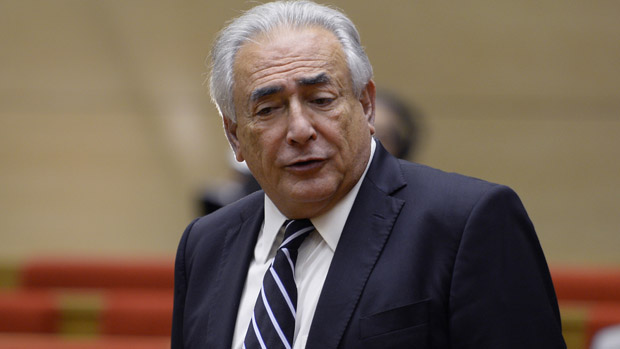Dominique Strauss-Kahn's pimping trial begins in France
L'Affaire du Carlton continues as former IMF chief faces charges of 'pimping in an organised group'

A free daily email with the biggest news stories of the day – and the best features from TheWeek.com
You are now subscribed
Your newsletter sign-up was successful
Dominique Strauss-Kahn is to go on trial in France to face charges of pimping in one of the biggest trials of the year.
The former head of the International Monetary Fund (IMF) is accused of organising and joining sex parties in Belgium, France and the US, where women were paid to take part in orgies.
Strauss-Kahn, the 65-year old former presidential hopeful, has admitted attending such sex parties , but denies knowing that the women involved in the orgies were prostitutes, the BBC reports. He has dismissed the charges as "dangerous and malicious insinuations and extrapolations".
The Week
Escape your echo chamber. Get the facts behind the news, plus analysis from multiple perspectives.

Sign up for The Week's Free Newsletters
From our morning news briefing to a weekly Good News Newsletter, get the best of The Week delivered directly to your inbox.
From our morning news briefing to a weekly Good News Newsletter, get the best of The Week delivered directly to your inbox.
While neither prostitution nor buying sex is illegal in France, these charges cover of variety of crimes including the aiding, abetting, organising, encouraging or assisting in the prostitution of other people. "Pimping in an organised group" carries a maximum prison sentence of 10 years and a 1.5 million euro fine.
The case, known as L'Affaire du Carlton, began in 2011 following an investigation into a prostitution ring at the four-star Hotel Carlton in Lille. Strauss-Kahn was not involved in the alleged activity, but the case was widened after he was named by sex workers in a subsequent investigation.
Other influential people accused include a police commissioner, a barrister, two luxury hotel directors and the owner of a chain of brothels known as "Dodo the pimp". All of the accused deny the charges.
Strauss-Kahn has been accused, but never convicted of several sex offences. In 2011, he stepped down as head of the IMF after he was accused of attempted rape by a hotel maid in New York. The charges were eventually dropped.
A free daily email with the biggest news stories of the day – and the best features from TheWeek.com
"[This] case is unprecedented in France," argues The Guardian's Kim Wilshire, "where strict privacy laws have until now largely prevented light being shone into the darker, sleazier corners of politicians' personal lives."
"It is also seen as a test of French voters’ broad-mindedness about their politicians’ sexual proclivities, and evidence of an austere new morality in a country that has long mocked "Anglo-Saxon Puritanism," she says.
-
 Buddhist monks’ US walk for peace
Buddhist monks’ US walk for peaceUnder the Radar Crowds have turned out on the roads from California to Washington and ‘millions are finding hope in their journey’
-
 American universities are losing ground to their foreign counterparts
American universities are losing ground to their foreign counterpartsThe Explainer While Harvard is still near the top, other colleges have slipped
-
 How to navigate dating apps to find ‘the one’
How to navigate dating apps to find ‘the one’The Week Recommends Put an end to endless swiping and make real romantic connections
-
 Epstein files topple law CEO, roil UK government
Epstein files topple law CEO, roil UK governmentSpeed Read Peter Mandelson, Britain’s former ambassador to the US, is caught up in the scandal
-
 Iran and US prepare to meet after skirmishes
Iran and US prepare to meet after skirmishesSpeed Read The incident comes amid heightened tensions in the Middle East
-
 Israel retrieves final hostage’s body from Gaza
Israel retrieves final hostage’s body from GazaSpeed Read The 24-year-old police officer was killed during the initial Hamas attack
-
 China’s Xi targets top general in growing purge
China’s Xi targets top general in growing purgeSpeed Read Zhang Youxia is being investigated over ‘grave violations’ of the law
-
 Panama and Canada are negotiating over a crucial copper mine
Panama and Canada are negotiating over a crucial copper mineIn the Spotlight Panama is set to make a final decision on the mine this summer
-
 Why Greenland’s natural resources are nearly impossible to mine
Why Greenland’s natural resources are nearly impossible to mineThe Explainer The country’s natural landscape makes the task extremely difficult
-
 Iran cuts internet as protests escalate
Iran cuts internet as protests escalateSpeed Reada Government buildings across the country have been set on fire
-
 US nabs ‘shadow’ tanker claimed by Russia
US nabs ‘shadow’ tanker claimed by RussiaSpeed Read The ship was one of two vessels seized by the US military